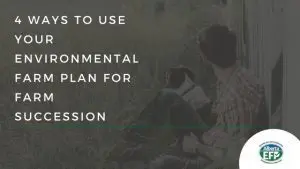
Environmental Planning – Carving out a role in the succession of your farm
Besides all of the expected reasons to have an environmental farm plan, one often overlooked reason is the opportunity to engage youth in your operation. If your farm is looking for a way to transition to the next generation, consider creating, finishing or updating an environmental farm plan.
Connect to the Bigger Picture
If you farm, you’re connected to the land and have concern for the future viability of the natural resources it houses. If you live on your farm, you care about clean water, air and viable soil. Creating a plan to reduce environmental impact is a starting point where people on the farm can agree. A critical part of the Alberta Environmental Farm Plan is to connect the natural resources, to the operations. Through this process, you are bound to understand the natural resources even if you have been living on the farm for years. You can engage a younger (or older) member of the farm by deepening their connection to the land can be a motivating force.
Develop a Clear Role
Planning in this way makes your operation relevant for generations to come. The next generation on the farm needs to carve out a role for themselves (or perhaps carving out a new role for someone who is looking to pass the farm on). Having a clearly defined project like an environmental farm plan can be a great way for a person to transition to a new decision-making role. It can also help those parents and the young person to highlight ways that they can build management thinking not only in the operations but the full scope of the business.
Leverage Strengths and Interest Areas
A report by the UN points out that youth should be more motivated to help in this area since they will be likely living with the consequences of the choices made today. On a micro level, this is may be the case for your farm too. Young people looking to take over the farm are going to have to manage the natural resources to make sure that it provides a living in the long term, much like older generation has for years. The same UN report highlights how intergenerational education is a useful way to gain a depth of knowledge that they can’t get from youth culture or peers alone. The process of environmental farm planning encourages independent learning and can lead to a new understanding of the industry that these young people are about to enter. At the same time, just because the older generation is looking for change themselves, doesn’t mean that they don’t care about the farm and its impact. On the contrary, those that have farmed the land for generations have a unique connection to it, seeing it go through many growing seasons and knowing how it has provided for the family.
Train, Discuss, Plan
Adopting an environmental plan is such a useful training tool. The plan is thorough and likely there will be many conversations on the inner workings of the farm because of the requirements of the project. The environmental farm planning process is an excellent way to stimulate that discussion so that a young person can get a very thorough understanding of many aspects of the farm operations. If there is not a formal training program already in place, this is an easy way of implementing one that can take into account a variety of learning styles. Combining new technologies with the wisdom of previous generations is important to be able to see the advantages the farm has through a different lens. Innovation that can contribute to the farm to reduce its environmental impact may also be the discovery of a practice that helps to lower costs or increase efficiencies. Fresh eyes (or at least perspective) on the operation can highlight overlooked opportunities.
If your farm is going through a succession planning process, consider environmental farm planning as a tool to help you through the transition. Building a clear role for new (and old) partners in the farm can be motivating and inspiring for all involved.
References:
Huddart-Kennedy, E., Beckley T.M., McFarlane, B.L., Nadeau, S. 2009 “Rural-Urban Differences in Environmental Concern in Canada” Rural Sociology 74(3), pp. 309–329 Copyright E 2009, by the Rural Sociological Society
United Nations 2003. Youth and the Environment, World Youth Report; (pp 131-147) New York, United Nations Reproduction Section
Who can I contact?
Alberta EFP Director. 587-200-2552. info@albertaefp.com
 Initiative
Initiative

